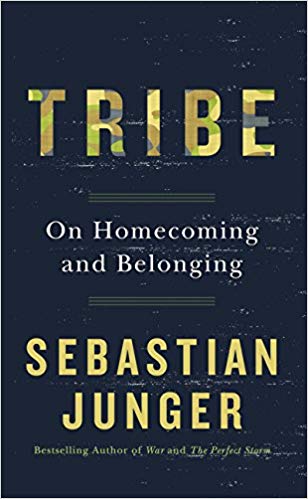Tribe: On homecoming and belonging by Sebastian Junger
Sebastian Junger’s book ‘Tribe : On homecoming and belonging’ is an easy to read extension of a previous article he had written for Vanity Fair which details common human behaviour in groups.
The concept that humans are naturally happier and more productive when in and working for a group is explored at the commencement of the book by looking at the Native American Indians during the Western colonisation. The concept that Western settlers would often run away to join the Native Indians, but never the other way around, is explored as proof of the idea that humans seek community over any form of modern luxury.
This book uses historical case studies such as the bombing of England in wartime to then discuss the phenomenon that tragedy, both natural and man-made, leads to unity and cohesiveness which in turn lowers the rate of depression and suicidal ideation. Junger postulates that ‘Humans don’t mind hardship, in fact they thrive on it. What they mind is not feeling necessary’. In times of hardship, communities must often band together for the best chance of survival, therefore making every individual feel necessary and a part of the ‘tribe’.
The book makes the not so distant leap to then discuss an area that the author holds most of his experience which is soldiers at war and homecoming. The bonds of brotherhood formed in the small ‘tribes’ of soldiers deployed on operations, where the survival of the team is dependent on the actions and therefore trust and cohesiveness of every individual in the ‘tribe’ is explored.
Upon homecoming, soldiers are forced into an alternate reality that they have generally compartmentalised for the duration of their deployment as a method of survival. Combined with this change in environment is the removal of the ‘tribe’ that they had formed whilst deployed. Junger explores the repercussions of this change on the soldiers’ psychological health, as well as investigates some of the methods commonly used by soldiers in overcoming these issues through returning to a community or ‘tribe’.
Reading this book as a Junior Officer solidified facts that I had already observed as an instructor, in the field environment and whilst on operations. Although Junger seems to almost encourage disasters to recreate the tribal and communal nature of humans, tactics such as these, but on a much smaller scale, are utilised by military commanders all the time to promote cohesiveness and teamwork.
From their induction into the military, soldiers and Officers are placed in situations that are curated to place the individual under pressure with a perceived threat. This threat can be something as simple as a member of the staff threatening to remove something valuable from the group such as relaxation time or even mobile phone use, or placing members of the group under physically and mentally challenging pressures. Doing so helps to build courage, loyalty and selflessness among the members of the group, all valuable traits in soldiers and Officers alike.
The concept that deliberately training and cultivating soldiers into these tribes for months on end, both pre-deployment and during deployment only to remove those bonds at the conclusion of the deployment is also a point I agree with Junger on. Current operations (not inclusive of individual rotations) are often made up of individuals from different work areas, Regiments and even Services. Often these entities come together months in advance of the deployment and spend around the next nine months as a team both prior to and during deployment, however once members return home, they will often return to their home unit location and even conduct decompression away from the Tribe that they have formed.
Although this is good to enable soldiers to get back to their families quicker and not a major issue at the moment as Australian soldiers are not currently conducting offensive actions on operations, it may be an issue for soldiers who do not have another Tribe to return home to. After reading this book one of my key take-away items would be to have a good understanding of the support networks subordinates have at the conclusion of a deployment, and where none exist, encourage the individual to join community and sporting clubs to create a similar environment of support to what they had whilst deployed. Coupled with a watchful eye and the occasional correspondence will ensure that all members feel supported in some fashion upon homecoming.
Overall, I thoroughly enjoyed reading this book. There is a lot of analysis that has gone into the book, despite the feeling that there is a great portion of the book left unwritten. I believe that there would be something to gain from every level of command in reading this, however I do warn of the overall tone of the book that war and destruction is the answer to a world that is ‘basically at war with itself’.
Jess Ward is a currently serving Australian Army Officer with over a decade of experience. Jess has commanded within Combat Brigades, on Operations and as an instructor. Jess has been published in ‘Winning Westeros: How Game Of Thrones explains modern military conflict’ as well as several professional military education websites. Jess curates The Bookshelf. Follow Jess at @JessPixWard.

